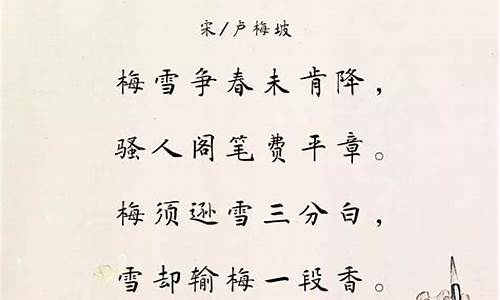您现在的位置是: 首页 > 励志语录 励志语录
英语八大句子结构句型总结_英语八大句子结构句型
tamoadmin 2024-09-07 人已围观
简介1.大学英语八大语法写作结构2.英语句子的八大基本结构是什么?3.英语的八大句型是哪些4.初中英语句子结构:5种常见句型英语句子结构及五种基本句型如下:1、Subject (主语)+ Verb (谓语);2、Subject (主语)+ Link. V(系动词)+ Predicate(表语);3、Subject(主语)+ Verb (谓语)+ Object (宾语);4、Subject(主语)+Ve
1.大学英语八大语法写作结构
2.英语句子的八大基本结构是什么?
3.英语的八大句型是哪些
4.初中英语句子结构:5种常见句型

英语句子结构及五种基本句型如下:
1、Subject (主语)+ Verb (谓语);
2、Subject (主语)+ Link. V(系动词)+ Predicate(表语);
3、Subject(主语)+ Verb (谓语)+ Object (宾语);
4、Subject(主语)+Verb(谓语)+ Indirect object(间接宾语)+Direct object (直接宾语);
5、Subject(主语)+Verb (动词)+Object (宾语)+Complement(补语)。
例句
1、Everybody laughed.
大家都笑了。
2、I love les.
我喜欢苹果。
3、The le pie tastes really delicious.
苹果派吃起来真是好吃。
4、I ge him my address.
我告诉他我的地址。
5、I find the clock broken.
我看到钟表坏了。
大学英语八大语法写作结构
1、英语基本句型结构主要有:Subject(主语)+Verb(谓语)、Subject(主语)+Link. V(系动词)+Predicate(表语)、Subject(主语)+Verb(谓语)+Object(宾语)等。
2、主谓结构:Subject(主语)+Verb(谓语),谓语动词均为不及物动词,后面不跟宾语,但可以跟时间、地点、方式等状语。
例句:
The rain has stopped.雨停了。
The sun rises.太阳升起来了。
You will success.你会成功的。
3、主谓宾结构:Subject(主语)+Verb(谓语)+Object(宾语),这里的谓语动词是及物动词,后面必须跟宾语。
例句:
She cooked her hushand a delicious meal.她给她丈答夫做了一顿美味的饭。
The story sounds interesting.这个故事听起来有趣。
4、主系表结构:ubject(主语)+Link. V(系动词)+Predicate(表语),常见动词有:be(是),become(成为),look(看上去),get(变得),turn(变得),grow(成为,变得),come(变得),ear(显得),sound(听起来),smell(闻起来)等。
例句:
They seem to be hungry.他们似乎饿了。
They look tired and thirsty.他们看起来又累又渴。
He looks handsome.他看上去很帅。
5、主谓宾+宾补结构:此结构中谓语动词为及物动词或短语,补足语可以是为名词、形容词、介词短语、分词、不定式。
例句:We keep the classroom clean.我们保持教室干净。
6、主谓+间宾+直宾结构:此结构中谓语动词为及物动词或短语,其后接直接(sb.)和间接(sth)两个宾语。
例句:Her father handed her a letter.她爸爸给她买了一本词典。
英语句子的八大基本结构是什么?
大学英语必备八大语法写作结构
导语:在大学英语写作中,如何打造一篇高分文章,词汇多变且句型丰富是重点。前者比较容易做到,后者需要扎实的语法基础。接下来我为大家总结了丰富句子的八大语法结构,希望对各位同学有所帮助。
?1. 主动句变被动句
?英文多被动,汉语多主动?,还需要警惕名词与动词之间暗含的?主被动?关系。
Eg1: It is said that ?据说/相传
Eg2:I suggest that ? It is suggested that ?
Eg3:Effective measures should be taken before things get worse.表建议
Eg4: your prompt attention to my enquiry would be highly reciated. 表感激
Eg5:Students should study hard.
Students are expected / well-advised to study hard.
?2. 简单句变从句名词性从句,含主语从句、宾语从句、表语从句和同位语从句四种;定语从句;状语从句
A. 主语从句:
Eg1:What worries many parents is that Internet or computer games may impact kids? study.
Eg2:It is said that an emperor of ancient China discovered Tea 5,000 years ago. (it为形式主语;that从句为真正主语)
B.宾语从句:
Eg1:Many Americans live on credit, and their quality of life is measured by how much they can borrow, not by how much they can earn.
Eg2: I am convinced that it is of great necessity for youngsters to study hard.
Eg3:明智的人不为别人的想法所影响。The sensible man is not influenced by what other people think.
C. 表语从句:
Eg1:That is why China is called the ?Kingdom of Bicycles?.
Eg3:In team games, practice is what improves our sense of cooperation.
D. 同位语从句
Eg1:(Martin Luther King) I he a dream that one day this nation will rise up and live out the true meaning of its creed: "We hold these truths to be self-evident, that all men are created equal." (该句中a dream = that 从句,)
Eg2:Others hold the different idea that online shopping brings us some problems.
E. 含同位语句式
A.人 身份
Eg. I am convinced that ?
As a college student, I am convinced that ?
I, as a college student, am convinced that ?
B. 物 性质
Eg. A strong will brings us power ?
As a vital quality, a strong will brings us power?
A strong will, as a vital quality, brings us power?
插入语
Eg1:As I see, the causes of this phenomenon are diverse.
The causes of this phenomenon, as I see, are diverse.
Eg2:All of a sudden, the silence of the lake was broken by a scream.
The silence of the lake, all of a sudden, was broken by a scream.
Eg3:Even so, others hold a different view.
Others, even so, hold a different view.
Eg4:Like anything else, automobiles he more than one side. (汽车跟很多其他事物一样,具有两面性)
Automobiles, like anything else, he more than one side.
F. 定语从句:
步骤:1)先写出正确简单句,确定被修饰成分(中心名词)
2)在中心名词后加入定从,关系词who, whose, whom, where, which, when
Eg1:Taobao is a particularly popular website. ? Taobao is a particularly popular website, where/in which customers can purchase various goods.
Eg2:I will advice my foreign friend to visit Great Wall, where he or she can acquire knowledge of Chinese history.?
?3. it 句式A. 形式主语 it is +被动/形容词/名词+that从句/to do ?
Eg1:It is suggested/ well-advised / supposed / proposed that sb. should (not) do ?
Eg2:It is essential / necessary / advisable / convenient/ difficult/ hard/ comfortable for sb. (not) to do
Eg3:It is essential / necessary that sb. should (not) do ?
Eg4:It is useless/useful doing sth.
B. 形式宾语
Eg1:An increasing number of students find it difficult to spell common words correctly.
Eg2:An increasing number of parents find it hard to he opportunities to chat with kids, who spend too much time on computers.
Eg3:A host of youngsters find it rather boring and hard to understand literature.
?4. 强调句A. 强调谓语:
Eg1:I love you. /I do love you. / I did love you.
Eg2:Cell phone/ Internet/ computer brings us convenience.
Cell phone/ Internet/ computer does bring us convenience.
B. 强调句式:It is/was +被强调成分+that/who+句子其他成分。
步骤
a. 先写出正确的简单句、并列句或复合句,明确单句的各个成分。
b. 在被强调成分(除谓语和补语外)两边添加it is/was 和that/who, 其他成分不变,必要时调整顺序。
强调句式特征去掉it is/was?that/who结构,整个句子无冗余或成分残缺。
Eg1:My mother always encourages me not to lose heart when I he difficulties in study.
It is my mother who/that always encourages me not to lose heart when I he difficulties in study.
It is when I he difficulties in study that my mother always encourages me not to lose heart.
Eg2:Parents? protection does not enable kids to build up adequate ability to face social competition.
(强调句式否定形式)It is parents? protection that does not enable kids to build up adequate ability to face social competition.
Eg3:The Internet does not enable some youngsters to spend adequate time in chatting with others face to face.
It is the Internet that does not enable some youngsters to spend adequate time in chatting with others face to face.
?5. 倒装A. 表否定的副词、短语或状语位于主语之前或句首,主句半倒装(一般疑问句语序);如never, seldom, hardly, scarcely, little, on no account, by mo means, in no case,
Eg1:I will never agree. Never will I agree.
B. Only +状语位于句首,主句半倒装。
Eg1:When my beloved is beside myself, I can feel the true hiness.
Only when my beloved is beside myself, can I feel the true hiness.
Eg2:When his computer crashes, he will come down-stairs for something to eat.
Only when his computer crashes, will he come down-stairs for something to eat.
Eg3:By doing small things, agers can accumulate ability and experience for something big.
Only doing small thing, can agers accumulate ability and experience for something big.
C.As/though倒装形式
Eg1:Although she is a girl, Zeng Yike is called Brother Zeng.
Girl as she is, Zeng Yike is called Brother Zeng.
Eg2:Though it is convenient, online shopping leads to some problems.
Convenient as/though it is, online shopping leads to some problems.
Eg3:Although it is simple, what the picture conveys is thought-provoking.
Simple as it is, what the picture conveys is thought-provoking.
?6.双重否定Eg1:no ____ is / are more _____ than ________.
In contemporary society, no means of communication is more popular and common than cell phones.
Eg2:A strong will is very important.
The importance of a strong will cannot be too emphasized.
Eg3:Education helps people to acquire knowledge, skills and new visions.
Without education, it is impossible for people to acquire knowledge, skills and new visions.
?7. Ving/ved 状语A. 两个动作同时发生且主语一致,将次要动作写成v-ing或v-ed形式做状语,即动作与逻辑主语之间为主动关系时写成v-ing形式、为被动关系是写成V-ed形式。
Eg1:I climbed the stairs. I took a suitcase.
I climbed the stairs, taking a suitcase.
Climbing the stairs, I took a suitcase.
Eg2:When they are compared with cars, bicycles are superior in several ways.
Compared with cars, bicycles are superior in several ways.
Bicycles, compared with cars, are superior in several ways.
B.两个动作主语一致,但前后发生,则可将先发生的.动作写成Hing +ved形式。
Eg1:He had lived in this city for years. He had no difficulty finding the way home.
Hing lived in this city for years, he had no difficulty finding the way home.
?8. 排比结构Eg1:Studies serve for delight, for ornament and for ability. (Bacon)
Eg2:We shall fight on the hills. We shall fight in the streets. We shall fight blood and sweet and tears. (Churchill)
Eg3:作为一种重要素质,自信带给我们力量、唤起我们对生活的热爱、帮助我们战胜困难。
As a vital quality, confidence brings us power, arouses our enthusiasm for life, and helps us to conquer difficulties.
大学英语中应用文写作,通过模板句型,经典的例句完全可以得到比较理想的分数,因为?言简意赅?就是它的特点。而大作文对于语言表达上的要求要高几个level,只是模式化的文字已经不足以打动老师,需要在原有的结构上进一步创新,让老师看的跌宕起伏,还是昏昏欲睡才是高低分的关键所在。
;英语的八大句型是哪些
八大基本结构:主语、谓语、宾语、表语、定语、状语、补足语和同位语八种。
主语是句子叙述的主体,跟汉语主语是一样的。谓语说明主语所发出的动作或具有的特征和状态。谓语由动词来承担。宾语是动作的对象或承受者,常位于及物动词或介词后面。宾语可由名词、代词、数词、名词化的形容词、不定式、动名词、宾语从句等来担任。
主语和谓语是英语句子的两大成分,除少数句子(如祈使句和感叹句等)外,一句话必须同时具有主语和谓语所表达的意思才能完整。主语是针对谓语而言的,是一句话的主题,谓语用来说明主语的情况,为主语提供信息。
例如:They are working.主语是they(他们),那么他们在做什么呢?看来没有谓语are working 是不行的。在正常情况下,英语的主语和谓语的位置与汉语一致,也就是说主语在前,谓语紧跟其后。关于哪些词语可以做主语,谓语,何时主谓倒置,主语与谓语的一致情况如何,下面会列出。
初中英语句子结构:5种常见句型
句子 sentence 是具有主语部分和谓语部分并有完整意义的可以独立的一组词。在英语里,句子的基本结构有下列五种。主语+谓语 I laughed.主语+谓语+(直接)宾语 Rose understands French.主语+谓语+间接宾语+直接宾语 He told us the whole story.主语+谓语+主语补语 或 主语+连系动词+表语He died a poor man.他穷困而死。Tom is a professor.主语+谓语+(直接)宾语+宾语补语 He found George intelligent. 主语+谓语+状语 We study hard.主语+谓语+直接宾语+状语 She has returned the magazine to the library.主语+谓语+直接宾语(方向,目标) Everybody should serve the people. 从句 subordinate clause主语从句 subject clause How this hened is not clear to anyone. 表语从句 predicative clause The trouble is that I he lost his address.宾语从句 object clause The payment should be made within five days.定语从句 attributive clause A man who sells books in a shop is called a bookseller.状语从句 adverbial clause A telegram came after you had gone.同位语从句 ositive clause The fact that the money has gone does not mean it was stolen.
句子 是 文章 的组成部分,只有组成了句子才有真正的意义。在英语 文章阅读 中,语法归根结底是为我们读懂文章而服务的,只要能够掌握基本的语法规律,无障碍的读懂复杂的句子,语法的任务就圆满的完成了。下面我就介绍5中初中英语句子机构常见句型:
一、Subject (主语) + Verb (谓语)
这种句型中的动词大多是不及物动词,所谓不及物动词,就是这种动词后不可以直接接宾语。常见的动词如:work, sing, swim, fish, jump, arrive, come, die, disear, cry, hen等。如:
1) Li Ming works very hard.李明学习很努力。
2) The accident hened yesterday afternoon.事故是昨天下午发生的。
3)Spring is coming.
4) We he lived in the city for ten years.
二、Subject (主语) + Link. V(系动词) + Predicate(表语)
这种句型主要用来表示主语的特点、身份等。其系动词一般可分为下列两类:
(1)表示状态。这样的词有:be, look, seem, smell, taste, sound, keep等。如:
1) This kind of food tastes delicious.这种食物吃起来很可口。
2) He looked worried just now.刚才他看上去有些焦急。
(2)表示变化。这类系动词有:become, turn, get, grow, go等。如:
1) Spring comes. It is getting warmer and warmer.春天到了,天气变得越来越暖和。
2) The tree has grown much taller than before.这棵树比以前长得高多了。
三、Subject(主语) + Verb (谓语) + Object (宾语)
这种句型中的动词一般为及物动词, 所谓及物动词,就是这种动词后可以直接接宾语,其宾语通常由名词、代词、动词不定式、动名词或从句等来充当。例:
1) He took his bag and left.(名词) 他拿着书包离开了。
2) Li Lei always helps me when I he difficulties. (代词)当我遇到困难时,李雷总能给我帮助。
3) She plans to trel in the coming May Day.(不定式)她打算在即将到来的“五一”外出旅游。
4) I don?t know what I should do next. (从句)我不知道下一步该干什么。
注意:英语中的许多动词既是及物动词,又是不及物动词。
四、Subject(主语)+Verb(谓语)+ Indirect object(间接宾语)+Direct object (直接宾语)
这种句型中,直接宾语为主要宾语,表示动作是对谁做的或为谁做的,在句中不可或缺,常常由表示“物”的名词来充当;间接宾语也被称之为第二宾语,去掉之后,对整个句子的影响不大,多由指“人”的名词或代词承担。引导这类双宾语的常见动词有:buy, pass, lend, give, tell, teach, show, bring, send等。如:
1) Her father bought her a dictionary as a birthday present.她爸爸给她买了一本词典作为生日礼物。
2)The old man always tells the children stories about the heroes in the Long March.
老人经常给孩子们讲述长征途中那些英雄的 故事 。 上述句子还可以表达为:
1)Her father bought a dictionary for her as a birthday present.
2)The old man always tells stories about the heroes to the children in the Long March.
五、Subject(主语)+Verb (动词)+Object (宾语)+Complement(补语)
这种句型中的“宾语 + 补语”统称为“复合宾语”。宾语补足语的主要作用或者是补充、说明宾语的特点、身份等;或者表示让宾语去完成的动作等。担任补语的常常是名词、形容词、副词、介词 短语 、分词、动词不定式等。如:
1)You should keep the room clean and tidy. 你应该让屋子保持干净整洁。(形容词)
2) We made him our monitor.(名词)我们选他当班长。
3) His father told him not to play in the street.(不定式)他父亲告诉他不要在街上玩。
4)My father likes to watch the boys playing basketball.(现在分词)
5) Yesterday I had a picture taken with two Americans.(过去分词)
● 常见的动词有: tell, ask, advise, help, want, would like, order, force, allow等。
● 注意:动词he, make, let, see, hear, notice, feel, watch等后面所接的动词不定式作宾补时,不带to。如:
1) The boss made him do the work all day.老板让他整天做那项工作。
2) I heard her sing in the next room all the time last night.昨天晚上我听见她在隔壁唱了一个晚上。









